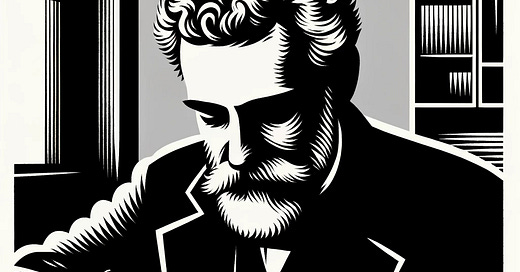Friedrich von Hügel: Transcending Trials
God is more living and real than all suffering and all sin
In his letter to a friend facing the twilight of illness, Friedrich von Hügel1 navigates the tender subject of suffering with depth, drawing from his own anguish of witnessing his daughter Gertrude's decline and eventual passing as a young woman. Von Hügel articulates a nuanced view of suffering, emphasizing that not all trials are dispatched by God but are permitted, marking a critical distinction that frames our tribulations within the realm of divine allowance rather than divine will. This perspective invites me to reframe my hardships and tragedies—they are not punitive but part of a larger, mysterious tapestry of spiritual transformation. By attempting to embrace my trials with trust, I can transmute (or transform) temporary dark hours into the enduring light of virtue.
(1916)
To a Friend in his last illness
I need hardly assure you that your illness–the weakness and pain you are suffering, in their various degrees and kinds of tryingness–that all these things are now very much in my mind and heart. Indeed they remain contantly present before me, even when they have to be in the background of my consciousness.
With our dearest Gertrud we were able, for a considerable time, to hope that God would still give her many a year of life.
And you yourself are not yet sixty, or barely that. May God give you yet many a year of life! But quite distinct from the question of the length of her life, was that of the quality of it—of the suffering and limitations mingling with, and imposed upon, pretty well all her activities. All these things were a present, indeed a pressing question.
And, looking back now, I am grateful for nothing so much as for this—that, given the suffering and trials which God then sent or permitted, He also soon gave her a light, far more vivid and continuous than it used to be, and an evergrowing acceptance and active utilisation of it, as to the place, meaning and unique fruitfulness of such suffering, thus met (as it were) halfway, in the mysterious, but most certain, most real scheme of the deepest life and of God.
When we first got to Rome, she was wonderfully plucky and courageous, 'grinning and bearing', a dear stoic. But then gradually she became, in this too, more and more sensitively Christian. The Cross became, not simply a fact, to bear somehow as patiently as we can, but a source and channel of help, of purification, and of humble power,–of a permanent deepening, widening, sweetening of the soul.
It was God's holy Will in her case that all this growth should promptly be for the other life. But it would, of course, in no way have been less precious had she been allowed to live on here, thus so greatly deepened and expanded, and rendered so far more helpful than ever before, and that for many a year.
I put all this to yourself, as I do to myself, because I have long felt that it is the apparent sterility of suffering which adds the final touch of trial to our pains; and that this appearance is most truly only an appearance. Not, of course, that suffering, simply of itself, is good or operates good; but that God is more living and real than all suffering and all sin; and that He can, and will, and does give concomitant (accompanying) opportunities and graces and growths to the sufferer, if and when the latter is humble, watchful and prayerful in such utilizations.
How I wish I could help much, very much, to lessen your pains, but—I admit—above all, towards their transmutation (transformation)! You can and will now help us all a hundred times more than when you were in health; suffering can be the noblest of all actions.2
Yours affectionately,
F. von Hügel
Friedrich von Hügel, an Austrian noble and a spiritual luminary of the early 20th century, significantly influenced Christian spirituality through his role as a spiritual director. He crafted the 3 Elements of Religion, a framework that promotes a balanced Christian life through its mystical, intellectual, and ethical dimensions. Deeply involved in the Modernist Crisis, von Hügel navigated the tensions between tradition and modern thought, advocating for a faith that engages with contemporary challenges. His teachings resonate with his conviction that faith encompasses more than we can grasp: "The more comprehensively we work to understand our faith, the more deeply we must realize that it ultimately transcends our understanding." His insights continue to inspire and guide believers in navigating their spiritual journeys.
Freiherr von Hügel, Friedrich. Spiritual Counsels and Letters of Baron Friedrich Von Hügel. United Kingdom: Darton, Longman & Todd, 1964.




